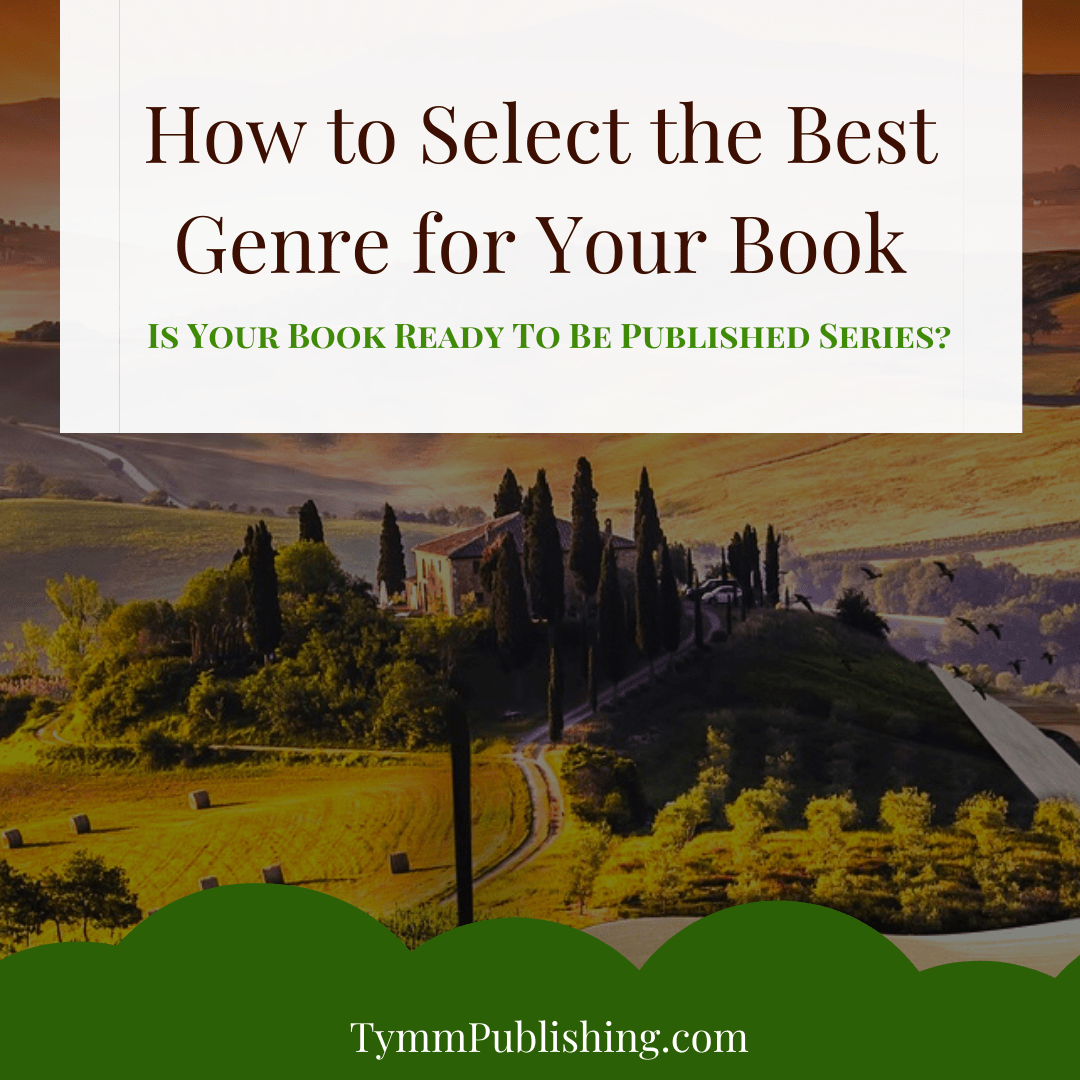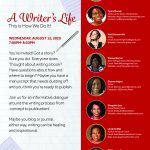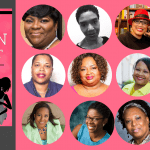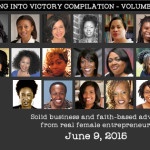How to Select the Best Genre for Your Book
In order to for word-of-mouth marketing to start for your book, it’s really important to know your genre. Knowing the reader most likely to be interested in your book will define your book marketing goals. There are readers who read across multiple genres, but generally most readers have a few favorite genres they may enjoy reading more.
As you decide on a publishing route, understanding your genre helps too. If you want to work with a traditional publisher, they will want you to know how your book compares to similar books in your marketing plans. Basically, they want to know if your book genre is going to benefit their profit margin.
If you’re an independent publisher or author, you definitely need to understand how books are categorized. With so many books being published, you don’t want to select the wrong category. You also don’t want to select a category simply because it appears to be where readers are flocking to for purchasing books. If your book really doesn’t fit, this can have bad consequences later.
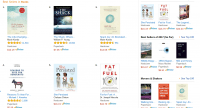
If defining your audience is new to you, plan to spend some time researching. You can easily start this process by searching on Amazon.com’s Bestseller’s List in your genre or category. Check out the left side and click through the MAIN categories and SUB categories.
As you’re searching take notice of the book covers. Book covers usually reveal to a reader the genre long before they read the back cover summary.
Fiction Genres
First, do you understand that you’re writing fiction? This may seem like a moot point, but I have met authors who state their books are novels when it’s really nonfiction.
Fiction is writing that comes from the writer’s imagination. The writing can be based on a true story, see 11 Novels You Never Knew Were True Stories.
If you write, fiction what is your genre? Genre are categories like romance, historic, suspense, fantasy, etc.
There are authors who don’t like defining their work, but marketing-wise, you need to let a reader know what to expect.
You can only publish in no more than two categories in most distributions.
Think about the main plot of the book. Where is the setting? What are the goals for the main characters?
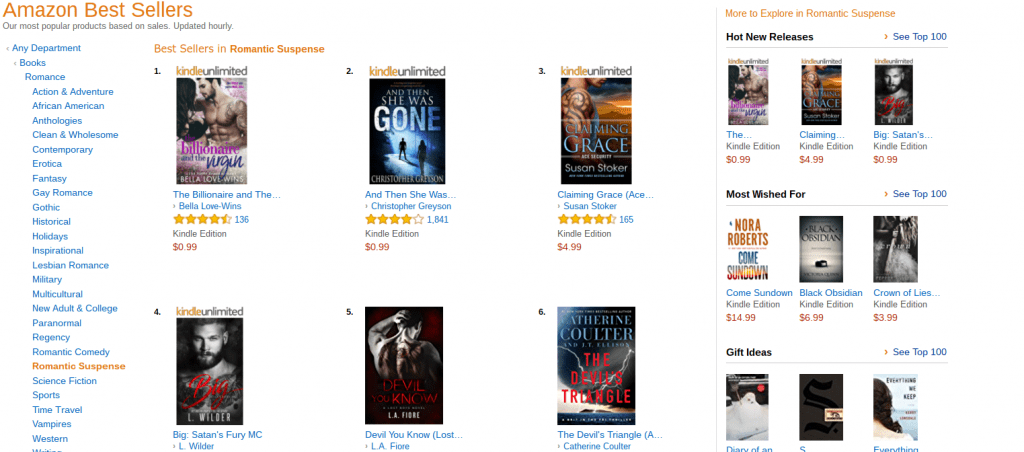
For example, if you write Romantic Suspense (this is the screenshot above). Readers who like romance are expecting a “boy meets girl” scenario, but the main plot of the book is suspense-driven. Often the suspense is what drives the couple together.
Your book may have fantasy, romance, and action, but it can’t be in all categories. If you have a fictional setting in a fantasy world, more than likely the main genre is Fantasy, but you have themes of romance and some thrilling action.
Nonfiction Genres
Nonfiction writers can include many categories like a business, biography, memoir, poetry, self-help, and more. Nonfiction does tend to be fact-based or sets out to teach the reader something new. When you search for nonfiction, especially in the self-help category, a lot of the books seem the same. With any book, there is nothing really new under the sun, but you can bring your own unique point of view.
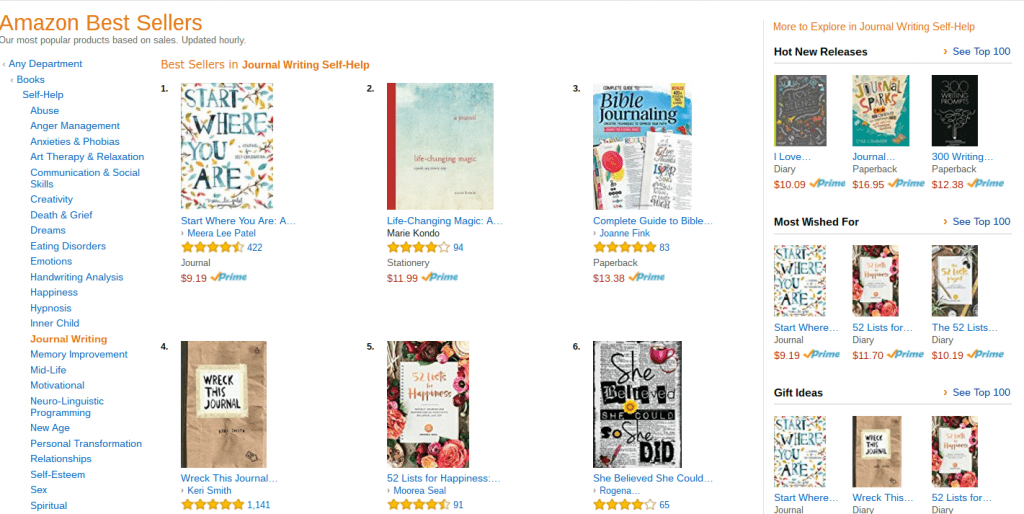
In the above screenshot, I pulled examples of Journal Writing books. What makes one journal book different from the other, but still captures those who are journal lovers.
Here are some ways to make sure you define your book and it’s a unique nonfiction offering.
- It helps to study what nonfiction books are already selling well.
- ️️What other authors share the readership that you’re looking for to purchase your books?
- What can you do different to appeal to those readers?
- How can you be sure your story or perspective is unique?
- Even more important, how will your book truly BENEFIT the reader?
The Multi-Genre Writer
If you’re like me and you write fiction and nonfiction or you write in multiple genres, you may find the source of your frustrations has to do with trying to market to too many audiences.
Use Pen Name: Some authors handle this by adopting a pen name.
Separate Audience: My fiction and nonfiction are all under my name, but I market by keeping the online presences separate. If someone comes to my main author website for my mystery books, there not usually going to be interested in book marketing or entrepreneurship.
So for my nonfiction books, I tend to market those through my business websites. It’s not easy to balance, but the good thing is nonfiction tends to be easier to market because of the Beyond the Book opportunities like blogging, vlogging, or podcasting.
Focus on Demographics
For anyone who comes to me and says my book is for everyone, I have to come back to ask them, “Are you sure?” If we think about our own reading habits, we know that there are genres of books we will not read. An author can not write for everyone because of people’s diverse reading habits.
A millennial may simply not be interested in what appeals to a baby boomer. As you focus on genre, questions to consider are demographics.
- ️What are the age ranges of readers?
- Does your book appeal more to women or men?
- Does your book focus on a ethnic, cultural or religious experience?
Focusing on a specific demographic is not a bad thing. In fact, narrowing your focus may help you easily find readers that would benefit from your book.
Tell us about your book and the genre in the comment section below.
Tyora Moody is the author of Soul-Searching Mysteries, which includes cozy mystery, women sleuth mystery, and mystery romance under the Christian Fiction genre. Her books include the Eugeena Patterson Mysteries, Serena Manchester Mysteries, Reed Family Mysteries, and the Victory Gospel Family Series.
When Tyora isn’t working for a literary client, she’s either loving on her cats, listening to an audiobook or podcast, binge-watching crime shows or Marvel movies, and of course, thinking about the next book. To contact Tyora about reviewing her books or book club discussions, visit her at TyoraMoody.com.

